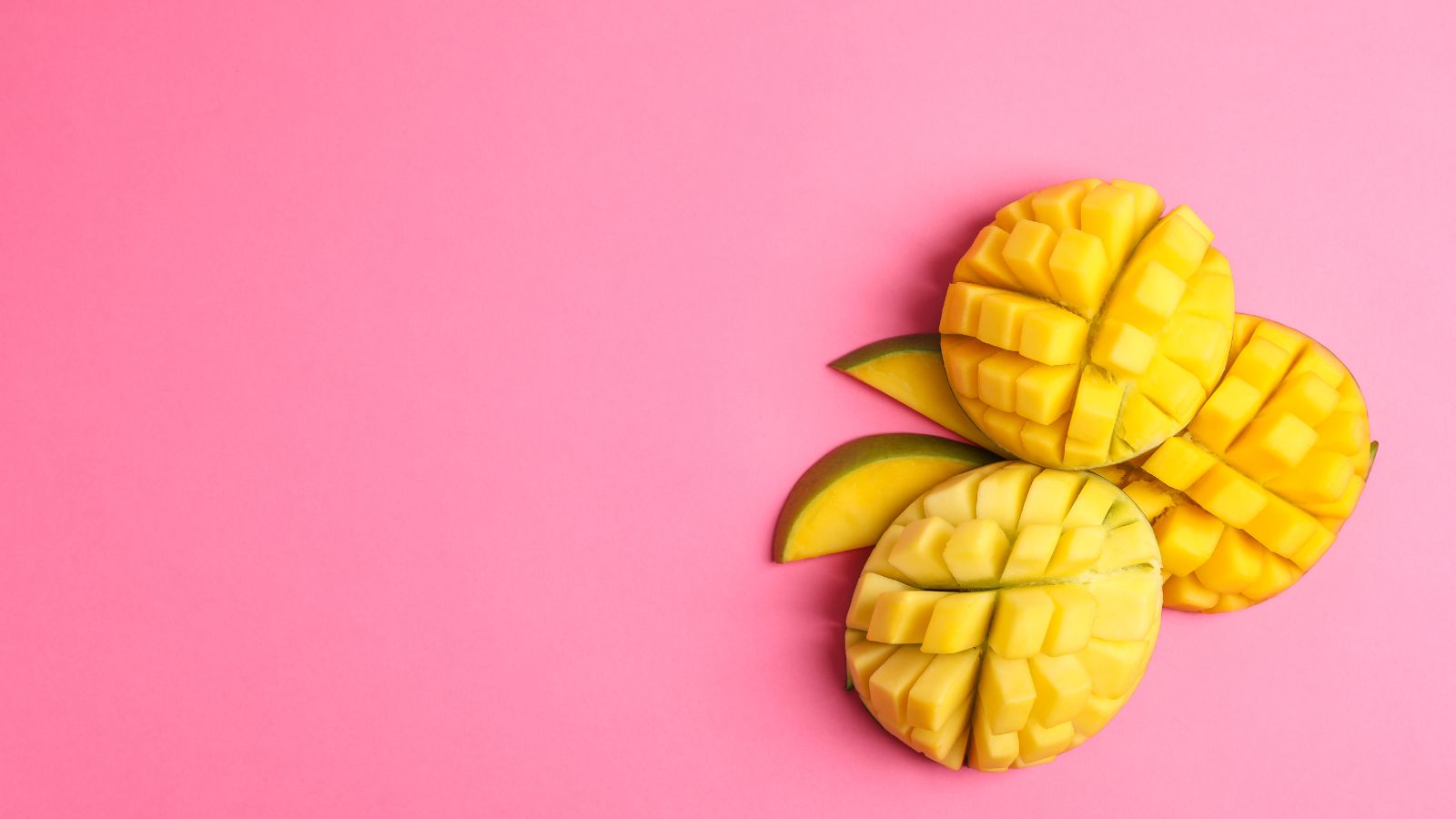
How Many Calories in a Mango: Plus Diet and Health Benefits
Photo Credits: Canva Pro
Do you want to know how many calories are in a mango? There are about 202 calories in a large mango (336g, without refuse), but this depends on the type, size, and level of ripeness. It has a lot of fiber, no fat, and a lot of vitamin C.
This tropical fruit is easy to add to most diets and is good for your digestion, immune system, and general health. Find out everything you need to know about this healthy food.
How Many Calories Are in 1 Whole Mango?
Photo Credits: Canva Pro
Calorie Content by Size and Weight
The Mango (Mangifera indica), is native to Southeast Asia and is widely consumed across the world. One of the most commonly asked questions about mango is, how many calories in a mango? The answer depends on the size and form of the fruit. A fresh mango is lower in calories than many snacks and packed with important nutrients.
Calorie estimates by standard serving size:
-
100g of fresh mango: ~60–80 calories (varies with ripeness and variety)
-
3/4 cup sliced mango (124g): ~70 calories — per FDA’s Reference Amounts Customarily Consumed (RACC)
-
1 cup sliced mango (165g): ~99 calories
-
1 whole mango (336g, without refuse): ~202 calories
-
1 cup dried mango: ~430–510 calories (depending on brand and added sugar)
Fresh mango provides volume, hydration, and nutrients without excessive calories, while dried mango should be eaten sparingly due to its high sugar concentration.
Nutritional Breakdown of Mango
Mango is a great food for your health because it is full of essential minerals and vitamins. It is a favorite fruit among health-conscious people because it has the right amount of macronutrients and micronutrients.
Key nutrients in one cup (165g) include:
-
Carbohydrates: ~25g
-
Sugar: ~22g
-
Fiber: ~2.6g
-
Protein: ~1.4g
-
Fat: ~0.6g
Mango is rich in the following micronutrients:
-
Vitamin C: 67% of your daily vitamin value.
-
Vitamin A, E, B6, and K
-
Folate and Copper: support pregnancy and fetal health.
-
Potassium: helps maintain blood pressure.
-
Iron and magnesium: contribute to overall energy balance.
Are Mangoes Good for Dieting?
Photo Credits: Canva Pro
How Mango Supports Weight Loss
A lot of people who are trying to lose weight argue about mango, but experts say it can be a healthy part of a diet. NDTV and OhioHealth experts say that the fiber and digestive enzymes in mango make you feel full and less likely to eat too much.
-
Low calorie density: More food volume for fewer calories.
-
Soluble fiber: Keeps you feeling full longer.
-
Polyphenols and antioxidants: Like mangiferin, support metabolism.
-
Diabetes-friendly in small portions: Due to its moderate glycemic index and fiber content.
Best Ways to Eat Mango on a Diet
Mango should be eaten in its most natural form to get the most health benefits and avoid too much sugar. Dietitians say that you should eat mango in between meals, not with main foods or in a liquid form.
-
Eat fresh mango: Avoid mango shakes, smoothies, or aamras with added sugar.
-
Pair with protein or fiber-rich foods: Mix with yogurt, oats, or chia pudding.
-
Snack timing: Eat mango as a mid-morning or afternoon snack.
-
Daily intake: 1 medium mango per day is an ideal limit.
Is One Mango a Day Too Much Sugar?
Photo Credits: Canva Pro
Understanding Mango’s Sugar Content
Many people think mango isn't healthy because it's too sweet. Mango has a lot of natural sugar, but when eaten whole, the fiber, vitamins, and minerals smooth it out and make it less high in blood sugar.
-
One cup of mango: ~22g of natural sugar.
-
Natural sugar vs. added sugar: Mango has fructose and glucose with fiber.
-
Fiber impact: Slows down sugar absorption in the body.
Blood Sugar and Glycemic Index Explained
The glycaemic index (GI) tells you how fast a food makes your blood sugar rise. With a GI of about 51, mango is in the low to moderate range. This makes it acceptable for people managing diabetes, when consumed wisely.
-
GI of 51: Considered a low-to-moderate GI food.
-
Pair with protein: Helps regulate sugar absorption.
-
Antioxidants in mango: May support blood sugar control and reduce the risk of certain cancers.
Is It Okay to Eat a Whole Mango?
Photo Credits: Canva Pro
How Much Mango Is Safe to Eat Daily?
It is normal and usually safe for most people to eat a whole mango. According to nutrition rules and the advice of experts, eating one medium mango a day is a healthy amount of fruit that gives you good nutrients. Still, each person's needs may be different based on their health, amount of activity, and dietary goals.
-
One medium mango (~150g, ~90–135 calories): Safe daily intake.
-
Excess intake: May cause digestive issues like gas or diarrhea.
-
Health considerations: Monitor if you have insulin resistance, diabetes, or high sugar sensitivity.
-
Balance: Combine with low-sugar foods throughout the day.
Should You Eat the Skin Too?
You can eat mango skin, which has unique compounds in it like polyphenols, fiber, and antioxidants like mangiferin. While not harmful for most, it has a bitter taste and may cause allergic reactions in some individuals.
Pros and cons of eating mango skin:
-
Contains fiber and mangiferin: Helps fight inflammation and oxidative stress.
-
Unpleasant taste: Tough and bitter texture.
-
Allergic potential: Similar to poison ivy for sensitive individuals.
-
Recommendation: Avoid unless well tolerated; always wash thoroughly.
Shop Healthy Mango Snacks at FullyHealthy
Health-Conscious Mango Products
There are a variety of mango-based snacks from FullyHealthy for people who want something quick and healthy. These snacks are great for people who want to add mango to their diet but don't want to carry around a lot of fruit.
-
Solely Mango Halves: Just dried mango, no added sugar.
-
That’s It Apple-Mango Bar: 2-ingredient fruit bar, rich in fiber.
-
Wild Zora Freeze-Dried Pineapple Mango Meal: Lightweight, great for travel or hiking.
-
Solely Mango 8 oz: Clean label snack with no preservatives.
Why Buy from FullyHealthy?
FullyHealthy's goal is to make it easy to eat clean and healthy foods.They prioritize products free from added sugars, preservatives, and artificial ingredients. You can eat your favourite fruit without giving up your health goals when you choose options made with mango.
-
Clean ingredients: No additives or preservatives.
-
Portion control: Great for mindful snacking.
-
Diverse formats: Bars, halves, and meal blends.
-
Health-forward mission: Emphasizes essential nutrients and dietary transparency.
Final Thoughts
The mango fruit is not only sweet, but also full of beneficial nutrients like vitamin C, fibre, potassium, and antioxidants. This makes it a good choice for everyday eating. Its impressive nutritional profile speaks for itself, it helps with digestion, boosts the immune system, and is helpful during pregnancy. Eat it fresh, stick to moderation, and enjoy several health benefits in every cup.
FAQs
What are the health benefits of mango for the body?
Mango gives vitamin, fiber, digestive enzymes, polyphenols, minerals, and supports the body.
How much vitamin c is in one cup of mango?
One cup has 67% vitamin c, making mango rich in this essential nutrient for the body.
Is it okay to eat one cup of mango daily for health benefits?
Yes, one cup gives important nutrients, protein, copper, iron, and can help with digestive issues in moderation.
Can mango help with certain cancers and digestion?
Yes, mango contains polyphenols and antioxidants like mangiferin, which have shown anti-inflammatory properties in lab studies. Its fiber and enzymes may aid digestion but could aggravate diarrhea.
Why is mango considered rich in health benefits and vitamin c?
Because mango was cultivated in southeast Asia, is packed with vitamin c, folate, essential nutrients, and is a fruit with several health benefits.

Leave a comment